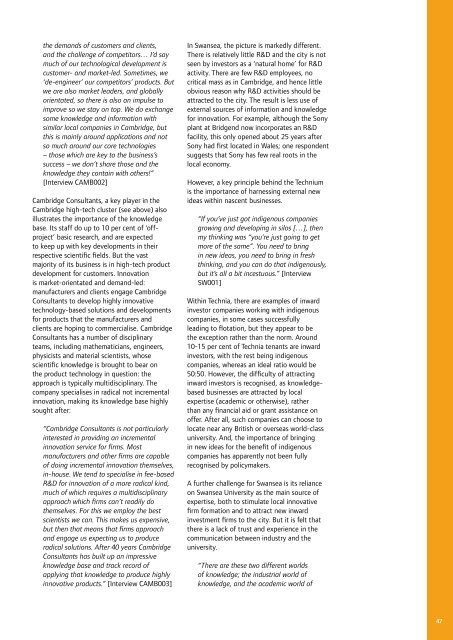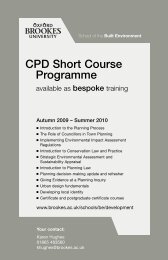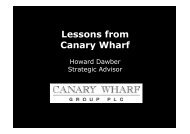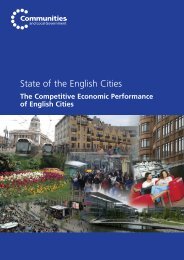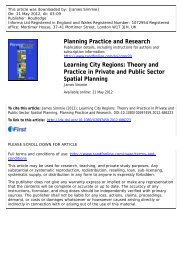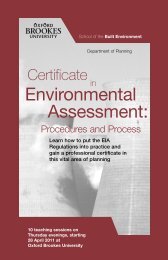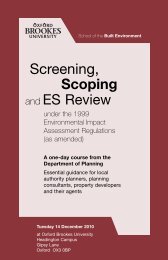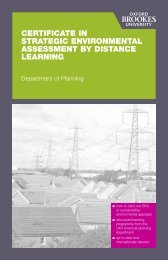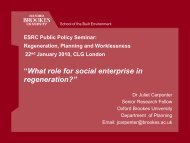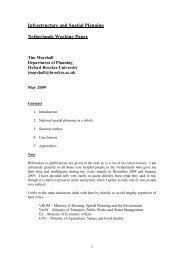History Matters: Path dependence and innovation in British city ...
History Matters: Path dependence and innovation in British city ...
History Matters: Path dependence and innovation in British city ...
Create successful ePaper yourself
Turn your PDF publications into a flip-book with our unique Google optimized e-Paper software.
the dem<strong>and</strong>s of customers <strong>and</strong> clients,<br />
<strong>and</strong> the challenge of competitors… I’d say<br />
much of our technological development is<br />
customer- <strong>and</strong> market-led. Sometimes, we<br />
‘de-eng<strong>in</strong>eer’ our competitors’ products. But<br />
we are also market leaders, <strong>and</strong> globally<br />
orientated, so there is also an impulse to<br />
improve so we stay on top. We do exchange<br />
some knowledge <strong>and</strong> <strong>in</strong>formation with<br />
similar local companies <strong>in</strong> Cambridge, but<br />
this is ma<strong>in</strong>ly around applications <strong>and</strong> not<br />
so much around our core technologies<br />
– those which are key to the bus<strong>in</strong>ess’s<br />
success – we don’t share those <strong>and</strong> the<br />
knowledge they conta<strong>in</strong> with others!”<br />
[Interview CAMB002]<br />
Cambridge Consultants, a key player <strong>in</strong> the<br />
Cambridge high-tech cluster (see above) also<br />
illustrates the importance of the knowledge<br />
base. Its staff do up to 10 per cent of ‘offproject’<br />
basic research, <strong>and</strong> are expected<br />
to keep up with key developments <strong>in</strong> their<br />
respective scientific fields. But the vast<br />
majority of its bus<strong>in</strong>ess is <strong>in</strong> high-tech product<br />
development for customers. Innovation<br />
is market-orientated <strong>and</strong> dem<strong>and</strong>-led:<br />
manufacturers <strong>and</strong> clients engage Cambridge<br />
Consultants to develop highly <strong>in</strong>novative<br />
technology-based solutions <strong>and</strong> developments<br />
for products that the manufacturers <strong>and</strong><br />
clients are hop<strong>in</strong>g to commercialise. Cambridge<br />
Consultants has a number of discipl<strong>in</strong>ary<br />
teams, <strong>in</strong>clud<strong>in</strong>g mathematicians, eng<strong>in</strong>eers,<br />
physicists <strong>and</strong> material scientists, whose<br />
scientific knowledge is brought to bear on<br />
the product technology <strong>in</strong> question: the<br />
approach is typically multidiscipl<strong>in</strong>ary. The<br />
company specialises <strong>in</strong> radical not <strong>in</strong>cremental<br />
<strong><strong>in</strong>novation</strong>, mak<strong>in</strong>g its knowledge base highly<br />
sought after:<br />
“Cambridge Consultants is not particularly<br />
<strong>in</strong>terested <strong>in</strong> provid<strong>in</strong>g an <strong>in</strong>cremental<br />
<strong><strong>in</strong>novation</strong> service for firms. Most<br />
manufacturers <strong>and</strong> other firms are capable<br />
of do<strong>in</strong>g <strong>in</strong>cremental <strong><strong>in</strong>novation</strong> themselves,<br />
<strong>in</strong>-house. We tend to specialise <strong>in</strong> fee-based<br />
R&D for <strong><strong>in</strong>novation</strong> of a more radical k<strong>in</strong>d,<br />
much of which requires a multidiscipl<strong>in</strong>ary<br />
approach which firms can’t readily do<br />
themselves. For this we employ the best<br />
scientists we can. This makes us expensive,<br />
but then that means that firms approach<br />
<strong>and</strong> engage us expect<strong>in</strong>g us to produce<br />
radical solutions. After 40 years Cambridge<br />
Consultants has built up an impressive<br />
knowledge base <strong>and</strong> track record of<br />
apply<strong>in</strong>g that knowledge to produce highly<br />
<strong>in</strong>novative products.” [Interview CAMB003]<br />
In Swansea, the picture is markedly different.<br />
There is relatively little R&D <strong>and</strong> the <strong>city</strong> is not<br />
seen by <strong>in</strong>vestors as a ‘natural home’ for R&D<br />
activity. There are few R&D employees, no<br />
critical mass as <strong>in</strong> Cambridge, <strong>and</strong> hence little<br />
obvious reason why R&D activities should be<br />
attracted to the <strong>city</strong>. The result is less use of<br />
external sources of <strong>in</strong>formation <strong>and</strong> knowledge<br />
for <strong><strong>in</strong>novation</strong>. For example, although the Sony<br />
plant at Bridgend now <strong>in</strong>corporates an R&D<br />
facility, this only opened about 25 years after<br />
Sony had first located <strong>in</strong> Wales; one respondent<br />
suggests that Sony has few real roots <strong>in</strong> the<br />
local economy.<br />
However, a key pr<strong>in</strong>ciple beh<strong>in</strong>d the Technium<br />
is the importance of harness<strong>in</strong>g external new<br />
ideas with<strong>in</strong> nascent bus<strong>in</strong>esses.<br />
“If you’ve just got <strong>in</strong>digenous companies<br />
grow<strong>in</strong>g <strong>and</strong> develop<strong>in</strong>g <strong>in</strong> silos […], then<br />
my th<strong>in</strong>k<strong>in</strong>g was “you’re just go<strong>in</strong>g to get<br />
more of the same”. You need to br<strong>in</strong>g<br />
<strong>in</strong> new ideas, you need to br<strong>in</strong>g <strong>in</strong> fresh<br />
th<strong>in</strong>k<strong>in</strong>g, <strong>and</strong> you can do that <strong>in</strong>digenously,<br />
but it’s all a bit <strong>in</strong>cestuous.” [Interview<br />
SW001]<br />
With<strong>in</strong> Technia, there are examples of <strong>in</strong>ward<br />
<strong>in</strong>vestor companies work<strong>in</strong>g with <strong>in</strong>digenous<br />
companies, <strong>in</strong> some cases successfully<br />
lead<strong>in</strong>g to flotation, but they appear to be<br />
the exception rather than the norm. Around<br />
10-15 per cent of Technia tenants are <strong>in</strong>ward<br />
<strong>in</strong>vestors, with the rest be<strong>in</strong>g <strong>in</strong>digenous<br />
companies, whereas an ideal ratio would be<br />
50:50. However, the difficulty of attract<strong>in</strong>g<br />
<strong>in</strong>ward <strong>in</strong>vestors is recognised, as knowledgebased<br />
bus<strong>in</strong>esses are attracted by local<br />
expertise (academic or otherwise), rather<br />
than any f<strong>in</strong>ancial aid or grant assistance on<br />
offer. After all, such companies can choose to<br />
locate near any <strong>British</strong> or overseas world-class<br />
university. And, the importance of br<strong>in</strong>g<strong>in</strong>g<br />
<strong>in</strong> new ideas for the benefit of <strong>in</strong>digenous<br />
companies has apparently not been fully<br />
recognised by policymakers.<br />
A further challenge for Swansea is its reliance<br />
on Swansea University as the ma<strong>in</strong> source of<br />
expertise, both to stimulate local <strong>in</strong>novative<br />
firm formation <strong>and</strong> to attract new <strong>in</strong>ward<br />
<strong>in</strong>vestment firms to the <strong>city</strong>. But it is felt that<br />
there is a lack of trust <strong>and</strong> experience <strong>in</strong> the<br />
communication between <strong>in</strong>dustry <strong>and</strong> the<br />
university.<br />
“There are these two different worlds<br />
of knowledge; the <strong>in</strong>dustrial world of<br />
knowledge, <strong>and</strong> the academic world of<br />
47


